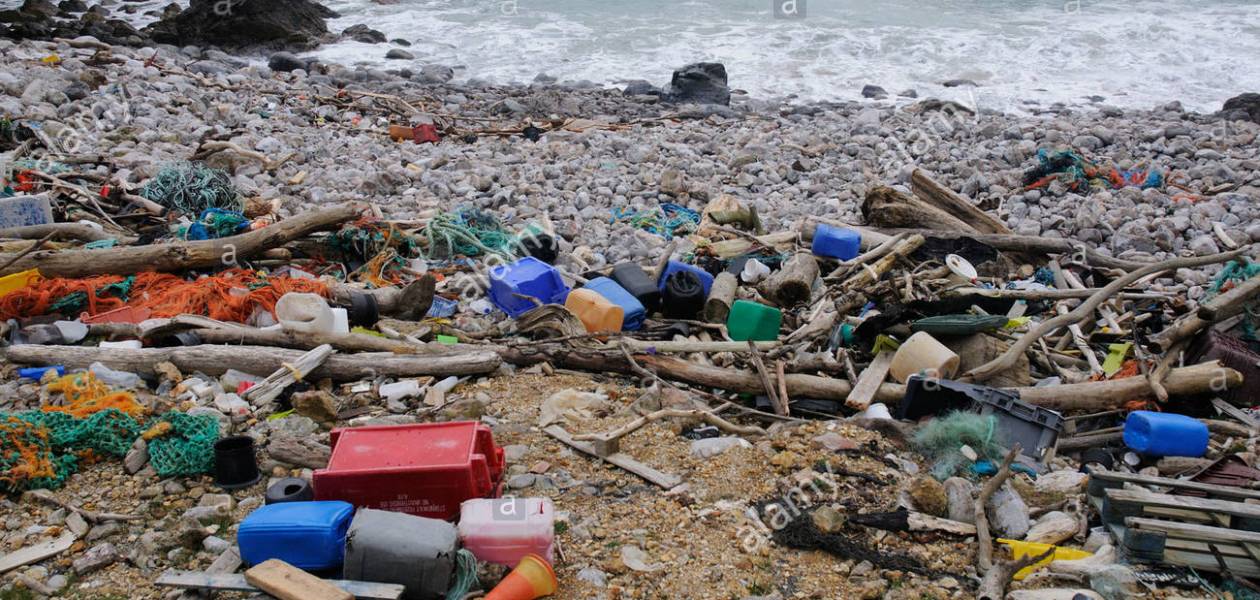
At this rate, the beautiful blue will soon be nothing more than a postcard memory; a natural beauty closer to a garbage can filled with plastic than to a sea sheltering a rich bio diversity spared from any danger. Indeed, the finding is overwhelming. The Mediterranean Sea is today one of the most polluted seas in the world.
The reports on this subject, from the various recognized NGOs, show disparate data. For some, more than 200,000 tonnes of plastic waste would be released into the Mediterranean, while others speak of 600,000 tonnes. Whatever the exact quantities, it is clear that this trend has been steadily increasing for many years and that if nothing is done to reverse the trend, the disaster will be as ecological as it is human.
Europe produces 60 million tonnes of plastic every year . Which makes it the second largest producer in the world behind China. After use, the 22 countries of the region generate 24 million tonnes of plastic waste, part of which flows into the Mediterranean via their main rivers. Of these 24 million tonnes, experts estimate that “42% are buried, 14% incinerated and only 16% are recycled . The various countries of the Mediterranean have their share of responsibility due to poor waste management. Indeed, we estimate at 28% the remaining part attributable to ineffective or non-existent actions; uncollected waste, in uncontrolled landfills or in the open, which heavily pollutes nature and the Mediterranean ”.
Giuseppe Di Carlo, director of the Mediterranean Marine Initiative of WWF, declared on this subject: "We produce in Europe an enormous quantity of plastic waste of which the majority is sent to landfill, resulting in the transport of millions of tonnes of plastic. in the Mediterranean every year. The consequence of this flood of contamination, associated with the specificity of the Mediterranean which is a semi-closed sea, is the record level of concentration of dangerous microplastics which threaten both marine species and human health. ”
To explain these record levels of pollution, Ifremer points the finger at commercial or pleasure navigation, fishing, aquaculture, landfills, industrial or urban areas. Without forgetting, of course, the tourist activity which contributes, by itself, to a very important part of this pollution.
No species of marine animal is immune to the dangers of plastic. A lot of waste is ingested by animals, believing it to be prey. Not only is this pollution a disaster for marine flora and fauna, but it also represents a significant danger for human health. As Isabelle Autissier, President of WWF France, underlined: “ The microplastics contained in our cosmetics or even the plastic bottles that we throw away negligently and which, once at sea, break into tiny fragments, are then eaten by the fish. They thus enter the food chain to our plates: we eat what they eat. "
Based on this sad observation, what is it possible to do? What measures should be taken in order to restore oxygen to the Mediterranean and its inhabitants?
- The first action that seems obvious and capable of producing its effects instantly is self-discipline. The solution is up to each of us. It is not very complicated to keep your waste and then throw it in the appropriate containers. Doing right takes as long as doing something bad. It is a reflex that every citizen should have without even thinking about it. It is to grant, once again, all the respect that the big blue deserves. And to a greater extent, it is a responsible approach to respecting oneself and the generations to come.
- Encouraging political measures have been taken and others are in preparation which should see the light of day soon:
- Ban on the distribution of disposable plastic bags at checkout since 2017.
- Law of 10 February 2020 on the fight against waste and the circular economy which provides for the ban of single-use plastics by 2040.
- Application of a financial penalty in the form of a bonus-malus to any manufacturer who does not respect the limitation of plastic over-packaging.
- From 2022, manufacturers and restaurants will have to take into account new bans in order to comply with the objective of zero disposable plastic by 2040:
- The free distribution of plastic bottles in establishments open to the public and in companies will no longer be authorized. Water fountains will come in replacement.
- Sponsors will no longer be able to impose the use of their bottles in cultural, sporting or festive events.
- The ban on plastic tea bags.
- The gradual and programmed disappearance of toothpaste tubes, laundry cans, yoghurt pots, shampoo bottles, among others.
All of this is not going to happen overnight. These programs require organization and innovation. Substantial budgets will have to be mobilized in order to support the various players in this transition. But there is no doubt that these measures will have a positive impact on the pollution of the Mediterranean and the oceans. Obviously, their effectiveness will be all the greater as the coordination with all the governments and organizations of the world will be strong and close. Only a collective and concerted approach of nations and citizens will overcome this ecological disaster. And perhaps, we will soon be able to congratulate ourselves on taking advantage of an eco-system and biodiversity that has finally been found.
Appointment is given for a next review in 2024 on the occasion of the Strategy Framework Directive for the Marine Environment (MSFD)
Posted on 2021-02-25 10:03








Comments